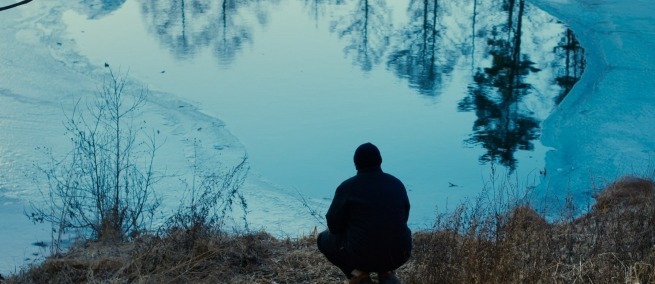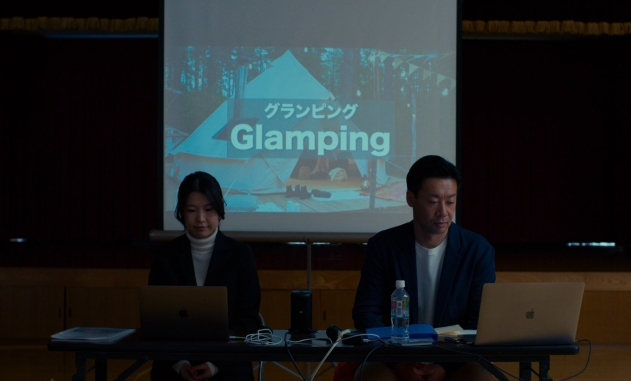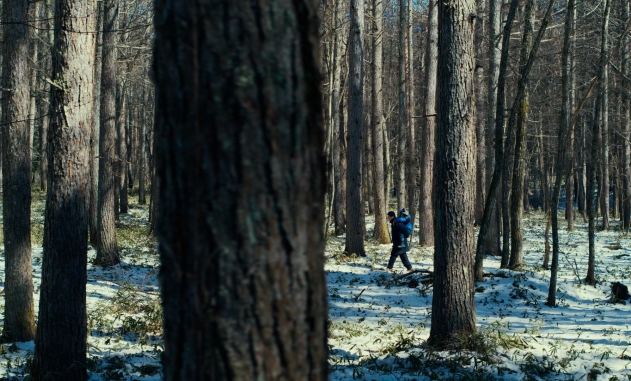
EVIL DOES NOT EXIST is the newest feature from Oscar-winning writer/director Ryûsuke Hamaguchi (DRIVE MY CAR). Set in a village outside of Tokyo, it follows tensions between the villagers and a glamping company proposing the village as a new destination for wealthy city-dwellers. The film was originally conceived of as a collaborative live performance between Hamaguchi and composer Eiko Ishibashi. It made its world premiere at the 2023 Venice International Film Festival where it won the Grand Jury Prize as well as the FIPRESCI Critics’ Award and is now being released theatrically by Sideshow/Janus Films. We spoke with Hamaguchi, with assistance from a translator, about his research, the film’s tone, and his depiction of the natural environment.
Science & Film: The film starts with a really beautiful shot of the tree canopy overhead, which is also how it ends, and I was wondering how you worked with your DP and if there were any specific techniques that you thought about in terms of bringing to life the landscape?
Ryûsuke Hamaguchi: Of course, with all of my films, my relationship with my DP is very, very important. But with this project in particular, because of the nature of the project, I actually had my DP be involved even before the script writing. So we looked around the area to see what kind of shots and framing were possible in the area. And that was because ultimately, the goal of this project was to create visuals for Eiko Ishibashi's live performance. So, we went about seeing the same things together and sort of did like a trial and error with the camera to see what might be possible in these landscapes. That's how we came to the tree shots that you were speaking about. How we shot that was we had the camera set up on top of a small pickup truck in Japan, and then we had the car move. But then we also put on a slow-motion effect to it as well. I think that resulted in sort of a gliding feeling to the image. And rather than making the trees feel more lively, per se, I think it makes you more able to interpret the images in an abstract manner, almost as if we're watching a moving painting of some sorts—or that's how I feel the effect is. That resulted in this very particular and important shot in the film.

Still from EVIL DOES NOT EXIST.
S&F: The film has been referred to as sort of an eco thriller or eco horror and I wonder what you think of that term or categorization?
RH: So when I hear the word eco thriller, I don't quite feel like eco thriller is really what I think about the film. When I hear thriller, that makes more sense to me. It's not that I wasn't thinking about ecological things at all, but I don't think it was my intention to make something that's initially called an eco thriller. That said, I think when you capture nature, as is, I think just inherently there is a fear that can be birthed there because ultimately, in comparison to urban environments, I think there are a lot of things that have been controlled and organized in a way where each day could be similar to the next. But when you live in a place with abundant nature, most things are not convenient for people—things aren't built to be convenient for people. So, if somebody is compelled to do something one day, it's not that they can necessarily make that possible immediately.
When you spend a lot of time within these natural landscapes, there is always going to be a possibility of death from the fact that you're there for a long time. For example, just seeing a girl amongst a wintry natural landscape does instill some kind of fear where you wonder whether she's going to be okay. And so simply put, I do think if you just capture nature as is, without hiding those facts, then I think you just naturally end up with something that perhaps you could call an eco-thriller of sorts.
S&F: What you're saying about the contrast between the controlled urban environment and the kind of unwieldy landscape is very much a part of the narrative that you build where the glamping company wants to come in and build this controlled environment, and then they hear about all the ways that it might impact the environment. So I just wanted to ask about that plot and where that came from for you?
RH: All of these things, specifically regarding the town hall meeting about glamping, all the details I discovered through research. Barely anything in there is something that I just thought up. In fact, where we shot there was a very similar incident of a town hall meeting that happened with the locals, with an urban company coming in wanting to start a glamping site. And through the company answering questions from the locals, how sloppy their plans were really started to reveal themselves and those answers started to self-destruct the plans.
When I first heard about this incident, it really made me think that something like this could happen, where urban ideas come along without quite understanding the locale or the land or the places that they're coming into. But I think these things happen quite often where plans are made, and they're kind of pushed forward without actually having a real understanding [of place].

Still from EVIL DOES NOT EXIST.
S&F: The investors in the glamping site are the ones pushing the plans forward in your film, whereas the landscape doesn't have the same kind of voice, or force, except for perhaps in the end. I'm wondering what you think about that.
RH: You talked about forces and this idea of investors and how money is used as a force to propel certain ideas and movements and actions. Whether the power or the forces of nature and the forces of money, whether those two things are different and very separate is a question to me because I do think that we live in a world where many kinds of forces are existing all over the place, and different forces come together to result in unexpected things and unexpected situations. I think power of money, or power of civilization, or natural powers and forces, those things I don't find to be separable from each other. I do ultimately think that humans are part of nature too. It just so happens that with this film and this story, almost out of necessity, the kinds of powers that gathered led to this particular result. That, to me, is the worldview that I have within this film.
♦
TOPICS